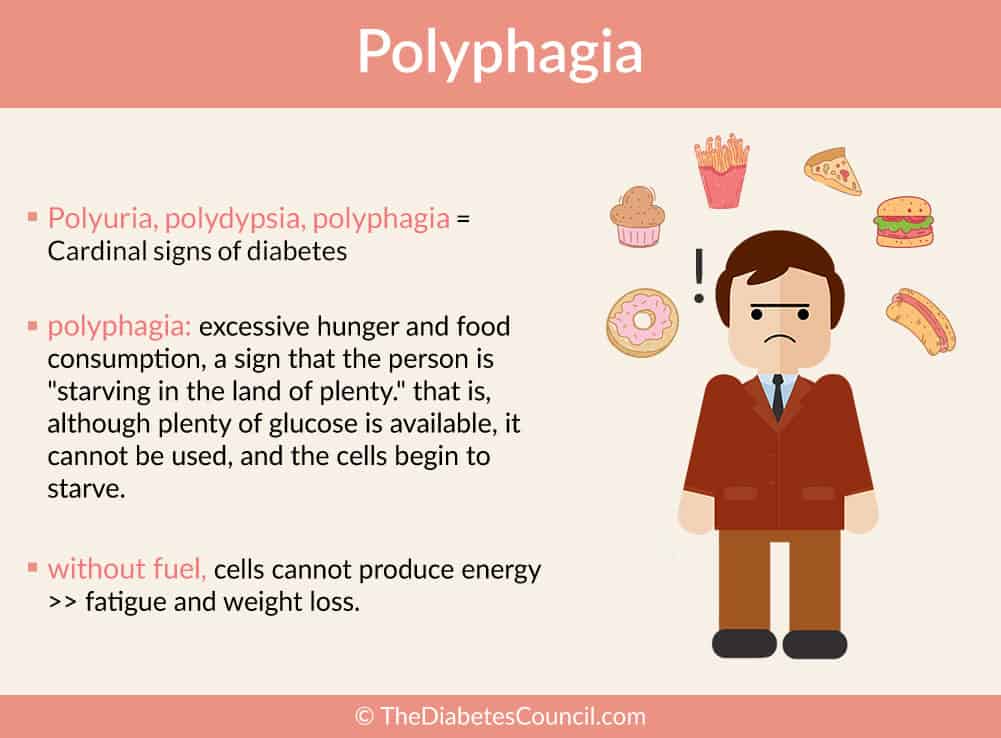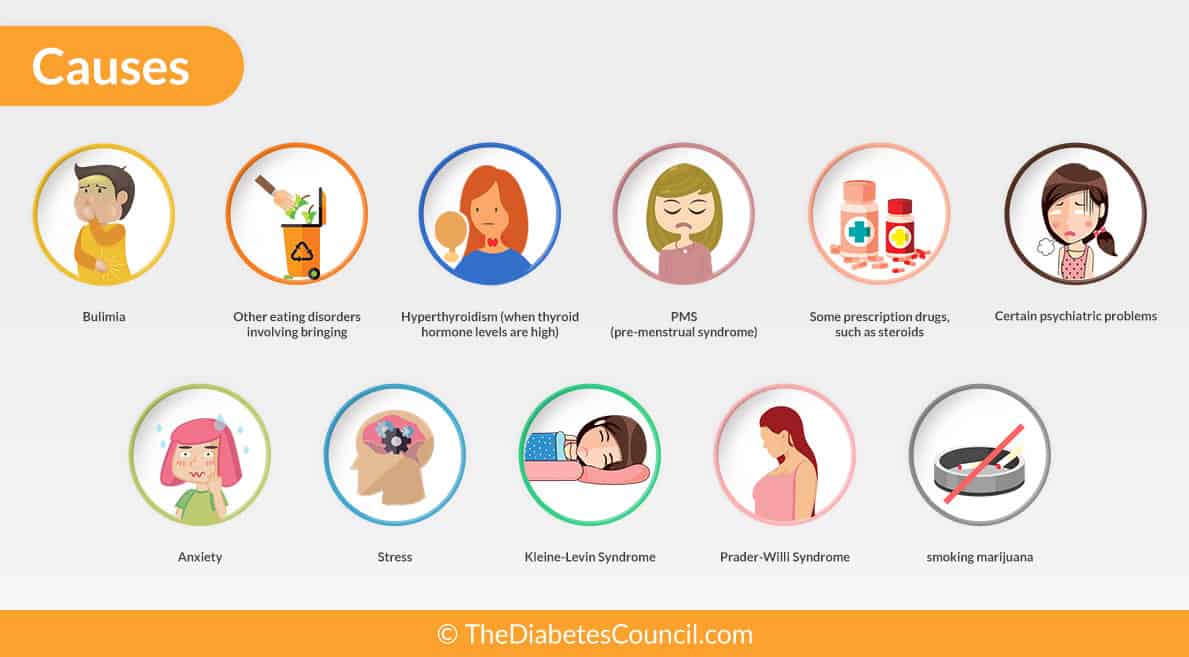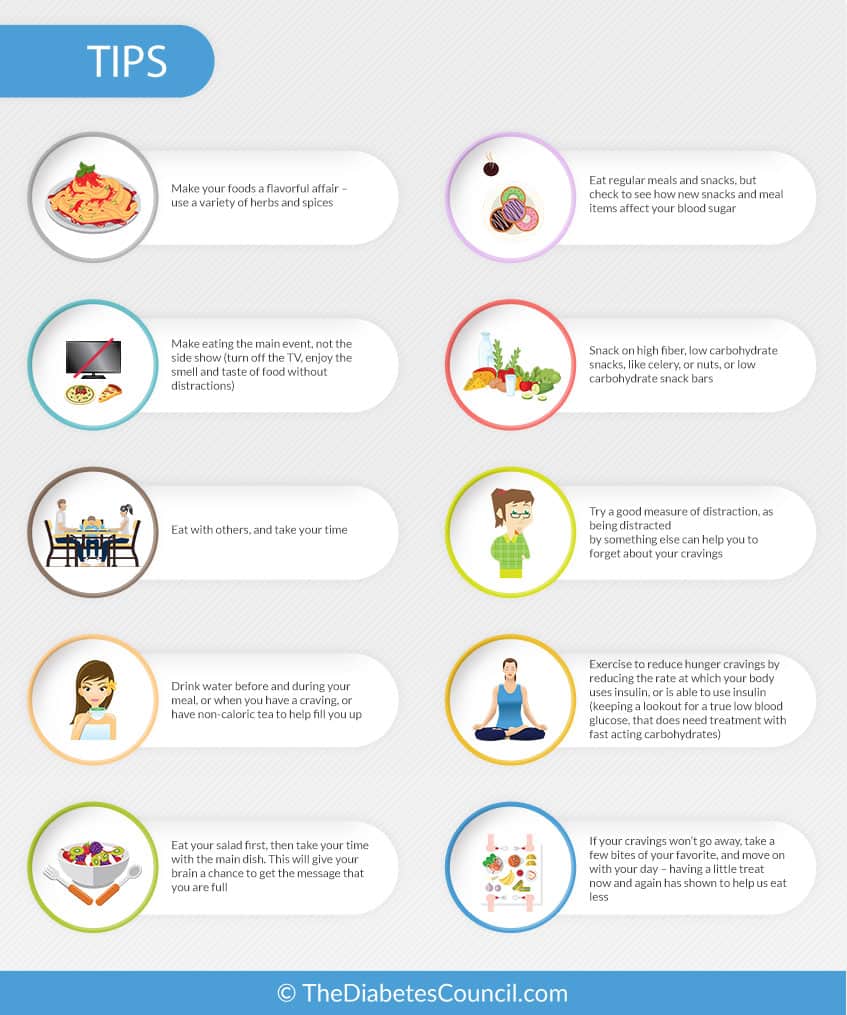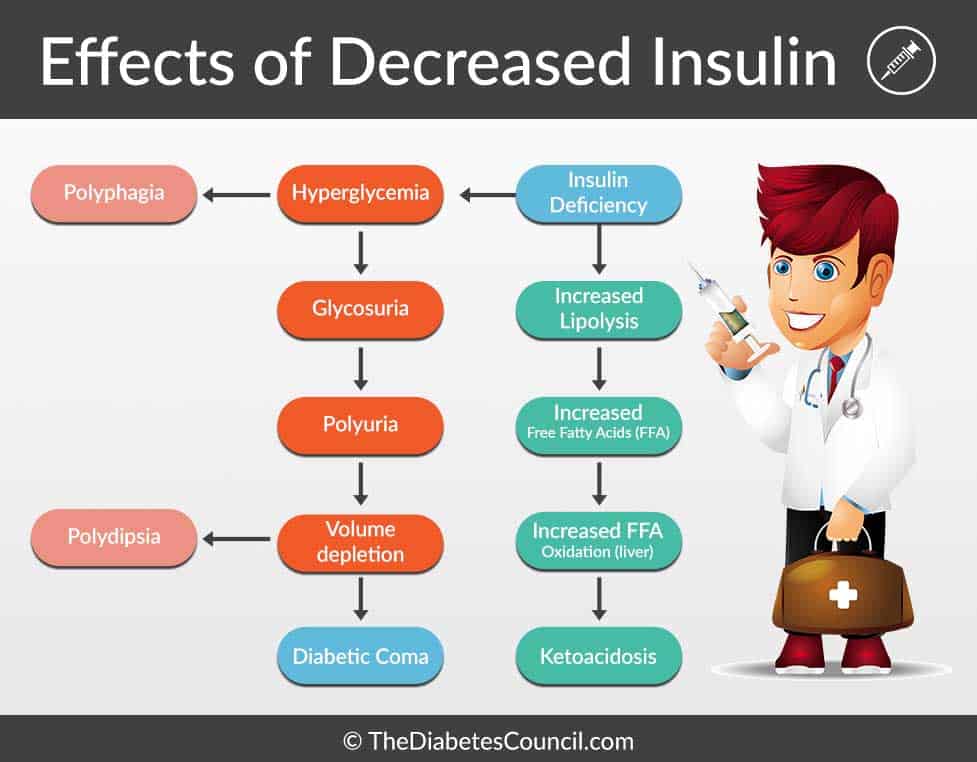Is hunger a sign of diabetes? If you don’t have diabetes, could hunger be one of the signs of diabetes? Is being hungry all of the time (polyphagia) a sign that you should go get checked for diabetes? After all, polyphagia is one of the “3 Poly’s,” is part of a triad of symptoms indicating diabetes.
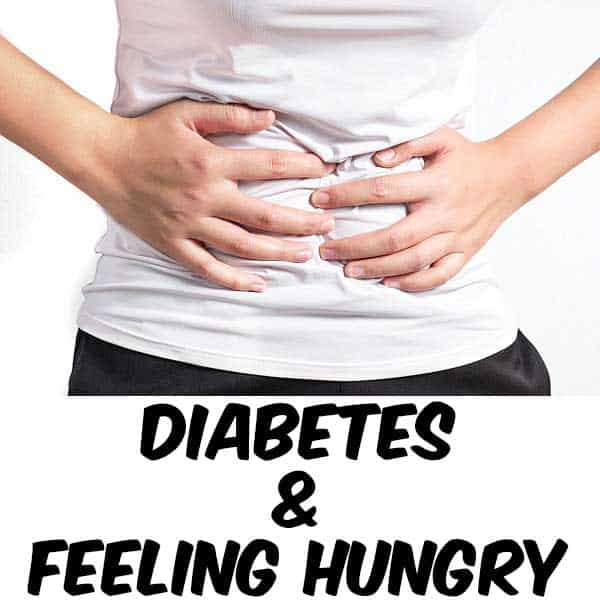
In addition to polyphagia, or increased hunger, the symptoms of polyuria and polydipsia are also signs of diabetes.
Contents
Susan’s story
Susan was constantly hunger. She never seemed to feel satisfied as she snacked off and on all day long from increasing hunger pangs. Susan’s hunger had gotten progressively worse over the past year.
She noticed that she had been going to the bathroom more frequently, and wasn’t sure if she might be getting a urinary tract infection. Oddly enough, she hadn’t gained any weight. She had even lost a few pounds. She visited her primary care provider, and relayed her symptoms to the nurse.
The doctor recommended that Susan be checked for several different conditions, but the one that stuck out in Susan’s mind was diabetes. She had an aunt with diabetes. She remembered how sick she got, and how she’d spend her days in the dialysis unit. Susan didn’t want diabetes, at least the kind that she knew about from her aunt.
When Susan contacted TheDiabetesCouncil, she was concerned that she did indeed have diabetes. She was waiting for her test results, but she was eager to find out if hunger was a sure sign that she has diabetes?
I suggest reading the following articles:
- One Drop Chrome Comprehensive Review
- Guide to Thiazolidinedione (TZDs) for Type 2 Diabetes
- How Can Your Diabetes Affect Your Friends, Family & Others Around You?
- Is Inhaled Insulin a Promising Treatment on the Horizon for Alzheimer’s Disease?
- Cost of Diabetes vs Other Diseases - In the US and Globally
We decided to look into it for Susan. Let’s see what we found.
Polyphagia: What is it?
With polyphagia, even after having just eaten, you will feel hunger, or find that you have cravings for particular foods that monopolize your thoughts. The definition of polyphagia, which is sometimes referred to as hyperphagia, means “excessive hunger and excessive intake of food.”
What causes it?
It’s true that diabetes can cause polyphagia, but it is not by far the only cause of excessive hunger. Diabetes, hypoglycemia or low blood glucose (with or without diabetes), and hyperglycemia or high blood glucose cause polyphagia.
Other causes of polyphagia include:
- bulimia
- other eating disorders involving binging
- hyperthyroidism (when thyroid hormone levels are high)
- PMS (pre-menstrual syndrome
- some prescription drugs, such as steroids
- certain psychiatric problems
- anxiety
- stress
- Kleine-Levin Syndrome
- Prader-Willi Syndrome
- smoking marijuana
Should you get checked for diabetes if you have polyphagia?
If you suspect that you may have diabetes, you should certainly see your healthcare provider. They will evaluate your symptoms, and determine if a test for diabetes is warranted.
Besides polyphagia, there are two other “polys” which are related to the symptoms of diabetes. If you have more than one of these symptoms, your healthcare provider may evaluate you for diabetes.
They are:
- polyuria (excessive urination)
- polydipsia (excessive thirst)
- and last but not least, polyphagia (excessive hunger)
In addition to these symptoms of diabetes, you may experience other symptoms due to untreated diabetes, or in this case, hyperglycemia. Whatever your symptoms are, they should be evaluated thoroughly by your healthcare provider. It could be diabetes, or it could be something else. Your healthcare provider will perform laboratory tests to determine if diabetes is the problem. This will involve drawing your blood to check for an elevated blood glucose. You will need to be fasting for this test. Your doctor may also order an A1C. This will determine whether you have diabetes or not, are pre-diabetic.
The following is a list of other symptoms that you may be experiencing, if you have diabetes:
- decreased concentration
- fatigue
- headaches
- blurry vision
- weight loss
- blood glucose greater than 180 mg/dl
- slow wound healing and infections
Hunger and diabetes
So you went to your healthcare provider, and they ran some tests. They then told you that your symptoms are indicative of diabetes. What is it about diabetes that makes you so hungry?
There must be something going on inside your body to cause this, right?
So what is it? Let’s look further.
Why am I constantly hungry with diabetes?
Your routine is the same. You find yourself back in front of the refrigerator. No matter how much you eat, you can’t seem to satisfy your gripping hunger. On top of that, there is the fatigue. Some days, you feel as if you can hardly keep going. It’s like your energy is completely drained. This is how one feels with diabetes. Your body cells are craving energy. They need food, but the food has been broken down by the stomach, and has entered the bloodstream in the form of sugar or glucose. Something has run amuck, and the blood sugar just sits there in the bloodstream. No wonder you are still hungry. It is like having a big meal behind a plate of glass and you can’t get to it. You know it is there. Your body needs it. Your body craves it, but you can’t get to it and use it for energy and to satisfy your hunger. You keep on being hungry. No needs are met.
How did this happen?
In the case of either Type 1 or Type 2 diabetes, symptoms develop gradually, but for two different reasons.
- Type 1 diabetes
If it is type 1 diabetes, it develops gradually. Your body produces some insulin before it decides to shut down insulin production altogether. Therefore, you should see signs of diabetes developing over time that may clue you in to seek medical care. At some point, your pancreas will shut down and stop producing insulin. At this point, a person with Type 1 diabetes may end up in the hospital with severely high blood glucose, sometimes causing a coma or “diabetic ketoacidosis.”
- Type 2 diabetes
Type 2 develops even more gradually than Type 1 diabetes. Most people diagnosed with Type 2 diabetes would have had some form of insulin resistance an average of five years before they received a diagnosis of the disease. Blood glucose can reach high levels, but there is some insulin that helps to bring it down somewhat. Therefore, the symptoms may be picked up during a routine checkup with your doctor or MD appointment for something else and the patient can end up blind-sided with the diagnosis, never having a clue that their symptoms were related to diabetes.
Why am I having food cravings?
Your cravings continue with diabetes due to the fact that the energy from the food you consume is not getting to where it needs to be. There is either not enough or no insulin to carry the blood sugar into your body cells, or there is insulin resistance at the cellular level. In the case of insulin resistance, this means that the insulin does not work the way it should. It should be the key that opens the door to let energy into the cell, but instead it’s like the locksmith took a nap while he was fitting your key. The key is not going to open the door. The insulin continues to float around in the blood stream, causing hyperglycemia.
Nearly everyone has food cravings, but for people with diabetes, cravings can undermine self-management in the worst of ways.
Giving in to cravings can spike your blood sugars, so you need to learn how you can deal with them. Some people who have cravings during times of stress tend to overeat. It’s one thing to have stomach pains because you have nothing in your stomach and you are truly hungry. It’s another thing altogether to devour an entire bag of cookies, or other high carbohydrate option, simply because it’s exam week, for example.
Hunger from diabetes is in a class by itself. It’s not related to emotional stress. It’s not related to an empty stomach most of the time, except with hypoglycemia, or low blood sugar. At any rate, you can curb those kinds of cravings by eating regular meals and snacks, and making sure to eat a breakfast high in protein. This will hold off cravings well into the day.
No, the hunger from untreated diabetes is from a lack of food on the cellular level. The sugar remains in the blood, and never makes it to the cells. Therefore, you could eat and eat with untreated diabetes and never feel full or satisfied. It may be that your body needs a medication to help your insulin work properly, and help it move blood glucose into the cells. These medications serve to “punch the pancreas,” and help it to push out more insulin to be used by the body.
It could be that you require insulin injections to move blood sugar in to your cells for energy. Your healthcare provider can determine if you need diabetes medications or insulin to help curb your cravings. Not all cravings can be handled with medications, as some cravings are related to a deprived diet, a need for comfort foods to satisfy some emotions, or simply because you saw a delicious food that you would like to eat. For some people with diabetes and without, food cravings are related to feelings of belonging or home.
Foods with fast acting carbohydrates or fattening foods tend to decrease our body’s stress levels, hence the name, “comfort foods.” Check to make sure that your diet has enough variety and variation of foods in order to feel satisfied.
I’m about to raid the food pantry. What do I do to stop me?
If you are feeling a bit like your will power has left you on the side of the road, here are a few tips to help you get rid of your cravings or curb them at least:
- make your foods a flavorful affair – use a variety of herbs and spices
- make eating the main event, not the side show (turn off the TV, enjoy the smell and taste of food without distractions)
- eat with others, and take your time
- drink water before and during your meal, or when you have a craving, or have non-caloric tea to help fill you up
- eat your salad first, then take your time with the main dish. This will give your brain a chance to get the message that you are full
- eat regular meals and snacks, but check to see how new snacks and meal items affect your blood sugar
- snack on high fiber, low carbohydrate snacks, like celery, or nuts, or low carbohydrate snack bars
- try a good measure of distraction, as being distracted by something else can help you to forget about your cravings
- exercise to reduce hunger cravings by reducing the rate at which your body uses insulin, or is able to use insulin (keeping a lookout for a true low blood glucose, that does need treatment with fast acting carbohydrates)
- if your cravings won’t go away, take a few bites of your favorite, and move on with your day – having a little treat now and again has shown to help us eat less
In a study conducted by Angelopoulos et al, results concluded that eating in slow pace increases fullness and decreases hunger, especially in patients who are overweight and obese and who have type 2 diabetes. Eating slow could be a prevention tool to help curb the amount of food which is being consumed by patients who have type 2 diabetes.
Does taking insulin effect hunger?
Insulin has an effect on adipose tissue. Studies have found that this results in increased hunger, heightened taste, and inevitably, more eating. In people without diabetes, just the mere sight and smell of food can trigger insulin release. People who tend to have this physiological response most often tend to be people who gain weight. Therefore, researchers have determined that increased insulin in the blood steam does cause hunger. Interestingly, the taste of sweet is heightened with the release of insulin into the bloodstream, causing people to eat more.
In other studies, people ate different foods, and researchers looked at the insulin levels while subjects were eating. They then measured the different levels while eating different kinds of foods. The researchers found that overeating is a combination of all factors, including environmental, biological, and behavioral.
Hunger and hypoglycemia
Hunger is a symptom of hypoglycemia, or low blood glucose, just as it is a symptom of hyperglycemia, or high blood glucose. Many clients have relayed stories of waking up in the middle of the night, in front of the refrigerator or pantry, unable to recall how they got there. After checking their blood glucose, they find that they have a blood glucose around 80. They have a nighttime low, and end up in a confused binge, judging from the empty jug of milk, or the cracker wrappers laying at their side.
One elderly lady with diabetes was given some valentine’s candy that she promptly put in a location where she would not be able to indulge on it, only to wake up covered in chocolate on the kitchen floor at four in the morning. Hunger can be a driving force. When our cells are starved for energy, we will do just about anything to get fuel.
Hunger and hyperglycemia
Assuming that you don’t have low blood glucose, hunger from diabetes can occur with hyperglycemia, or high blood glucose. This hunger occurs related to a lack of insulin, and less energy getting to your cells. In other words, your cells are starving. With hyperglycemia, you can eat and eat, and never feel satisfied, because the glucose is just floating in your bloodstream, and it’s not getting to where it needs to be to provide your cells with energy.
What should I eat when I am hungry with diabetes?
- When your blood glucose is low
For a low blood glucose, or hypoglycemia, you will want to consume carbohydrates with quick sugar to bring your blood glucose up fast. Usually 15 grams is sufficient. Use the rule of 15. Check your blood glucose. If it is less than 70 mg/dl, use 3-4 glucose tablets, 4-6 ounces of juice or regular sweet soda, to correct it. Remember to eat regular meals and snacks to avoid low blood glucose. Breakfast is not called the most important meal of the day for nothing! Be sure to eat ample protein to help keep you full throughout the morning.
- When your blood glucose is high
If your blood sugar is high, try some high fiber, low carbohydrate foods, such as raw vegetables, in order to fill you up, and be sure to drink plenty of water. If you cannot get blood glucose into your body’s cells, you may need a medication that tells your pancreas to make more insulin, or insulin in order to get energy to your body’s cells.
Are there any tips to stop food cravings with diabetes?
Food cravings without diabetes can add unwanted pounds. With diabetes, food cravings can become a significant problem. It can cause blood glucose spikes when you overeat with diabetes, and this can sabotage your diabetes self-management over time. That’s why it’s especially important to get control over your hunger cravings if you have diabetes.
Two types of cravings:
- physical
- emotional
For starters, check your stress levels. People crave the foods of home, or comfort foods in times when they are stressed. These foods are usually carbohydrate-loaded, and tend to sabotage diabetes self-management. Learning coping mechanisms for dealing with stress can help control cravings due to stress levels being high. If you are lonely or excessively bored, you are liable to eat more than usual, also.
Tame cravings:
- check your flavors – make sure you are eating enough interesting tastes and getting a variety of flavors in your diet
- increase flavorings, such as herbs and spices, as strong aromas tend to satisfy hunger more
- don’t distract yourself with TV or the internet, and take time to taste, smell, and savor your foods
- have a sit down meal with family or friends, and put your fork down between bites
- drink lots of water, and try eating your salad first
- eat high fiber snacks like nuts, raw vegetables, low sugar snacks
- when you are having cravings, do something to distract you from eating, like take a walk with a friend
- get regular exercise, as even brief exercise reduces cravings (always carry a carbohydrate snack with you when you exercise)
- have a small treat from time to time, and take a few bites of an especially delectable food
Tips on dealing with emotional eating:
- instead of thinking of food, get up and go outside. If it is a beautiful day, go for a hike or grab a book to read while soaking up the sun
- if you are bored, call a friend and arrange to meet for a walk or coffee
- take 5 to 10 and distract yourself. If you are still hungry after 10 minutes, allow yourself a small portion
- stack healthy food options around you, so when you do need to indulge, you are making better choices
- sometimes, hunger can also be a sign of depression or anxiety. In such cases, please seek out help from a mental health professional
Further articles to read:
- Closed Loop Systems: Future Treatment for Diabetes?
- Sensitive Feet and Diabetes: Why My Feet Hurt?
- Byetta for Type 2 Treatment: Comprehensive Review
- Can Diabetes Bankrupt a Country?
- Controlling Type 2 Diabetes Through Diet - Expert's Panel
Hunger and gestational diabetes
Polyphagia occurs in gestational diabetes, just as it occurs in Type 2 diabetes. Pregnant women may gain too much weight during their pregnancy due to polyphagia, and hunger cravings. Cravings in pregnancy are bad enough without diabetes due to hormonal changes. Add gestational diabetes on top of that, and you have cravings that are hard to stop. Some of the tips above will help women with gestational diabetes to avoid cravings as well. They should work with their healthcare providers in order to keep their blood glucose in a tight range, in order to avoid hunger from a high or a low blood glucose. We close this article now hoping you learned more about the mechanics of hunger and diabetes.
TheDiabetesCouncil Article | Reviewed by Dr. Christine Traxler MD on October 16, 2022
References


